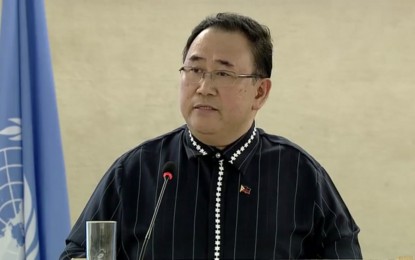
Undersecretary Severo Catura, executive director of the Presidential Human Rights Committee Secretariat (PNA File photo)
MANILA – The meddling of social media giant Facebook in Philippine political affairs has adverse effects on the human rights environment in the country.
Thus, said Undersecretary Severo Catura, executive director of the Presidential Human Rights Committee Secretariat (PHRCS) on Friday, citing the social media behemoth’s recent suspension of numerous accounts of Philippine government institutions and officials that have posted warnings on and incidents of violence committed by the Communist Party of the Philippines and the New People’s Army (CPP-NPA).
The CPP-NPA, Catura said, is declared a foreign terrorist organization by the US State Department, the European Union, and a number of States. The Philippine government has declared the same in a 2017 law signed by President Rodrigo R. Duterte.
“Facebook officials might dismiss their recent action as negligible, but they must realize that they acted in direct contravention of State authority and sovereignty and what they did is a complete disrespect and disregard of one of the most basic rights and freedoms in a democracy – that of expression – and, as a result, stifled the dissemination of the truth in national policy,” said Catura, who is also the spokesperson of the National Task Force to End Local Communist Armed Conflict (NTF-ELCAC) for human rights, peace process, and international engagements.
Protests elevated to Facebook officials led to the restoration of the suspended accounts.
“Sadly, no apology, not even a subtle one, was extended by Facebook after the suspensions were lifted,” he added in a statement.
As of late, in what has been viewed as an effort to equalize the score, Facebook suspended accounts of organizations and individuals with alleged links to the CPP- NPA.
“We thank Facebook for this redemptive move,” Catura said, “but its officials must understand that the suspension has already done its work in muddling the integrity of the information conveyed by the Philippine government, especially so that this same information had something to do with national security.”
He added: “For keen observers of Philippine affairs, especially those in the United Nations and the European Union, the fact that statements and messages of government officials were used as bases for the suspension of accounts already deems those same statements and messages as questionable and demeans the integrity of the deliverers.”
“By all accounts, the recent Facebook faux pas is a glaring abuse of the privileges of a business institution, and the government has no recourse but to act on this lest it be deemed as reneging on its State obligation to protect its people’s human rights,” Catura said.
He said no less than the UN, citing human rights in a business context, has called upon States to moderate online content; not to silence dissent, but to prevent harm that comes with abuse of discretion.
“The UN has, in fact, guided States in imposing regulations focused not on restriction, but on moderation, and to pursue the same with clarity, necessity, proportionality, and non-discrimination,” he said. “The UNESCO may also look into this matter as well, as this organization has always taken a keen interest in Philippine media affairs.”
Transparency
He added that in the same direction, business entities like Facebook must be transparent in the manner they curate content, even as States must likewise exercise the same transparency and clarity in requesting content restriction against certain entities that abuse their right as consumers.
“We highly regard not only Facebook’s contribution in enriching communication among people, especially Filipinos, but also its availability as an instrument in disseminating information that impacts national security and the situation of peace in the country,” Catura said.
This latter competence of Facebook, he added, is what needs to be protected as it becomes a cause for machination by anti-government entities parading as fact-checkers,” he said.
“The Philippines takes pride in being one of the freest environments – if not the freest – in the world that allows media’s free exercise of its mandate and mission,” Catura said, adding that it is host to thousands of mainstream and alternative media platforms that reflect a flourishing and enabling civic space.”
CHR probe
He added that while the government recognizes the relevance of all media platforms in this regard, it also needs to be wary of its weaknesses as players in a highly politicized environment.
“The people must not be left out in this moderation process as they, as Facebook users, have all the right to appeal decisions deemed unfair and unlawful and to seek interventions from the courts,” he said.
The PHRCS, he said, hopes that the Commission on Human Rights can look into this recent faux pas by Facebook.
He said the Department of Information and Communication Technology is mandated to "ensure and protect the rights and welfare of consumers and business users to privacy, security and confidentiality in matters relating to ICT, in coordination with agencies concerned, the private sector and relevant international bodies." (PR)
